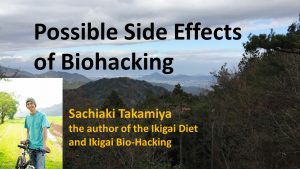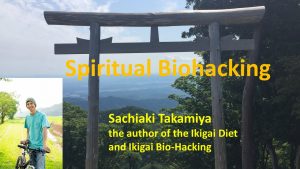Why Isn’t Biohacking Catching on in Japan?
The newsletter
The Ikigai Diet and Bio-Hacking
This is a picture of myself doing bio-steam, a Japanese biohacking method.
https://ikigaidiet.com/bio-harmonizing-yourself-through-bio-steam/
Biohacking isn’t big in Japan. Most people don’t know the term biohacking and there aren’t many sites come up if you search under biohacking in Japanese.
One site that came up was the site of Biohacker Center Japan run by Tateki Matsuda. Biohacker Center Japan is affiliated with the Biohacker Center in Finland, and Teemu Arina, the founder of the Biohacker Center is on the board as an adviser. It seems to be the official biohacking group in Japan.
Another person I often come across is Akitra Iguchi, the author of Biohack Nikutai Seishin Zuno no Pafo-mansu wo Saitekikasuru Gijutsu45, Biohack: 45 Techniques to Optimize Your Body Spirit and Brain. He is the organizer of the Biohack Summit in Japan. He says he is a friend of renowned biohackers such as Dave Asprey and Ben Greenfield. He seems to be bringing the biohacking culture from the West and introducing it to Japan.
Usually, when a new trend comes from the United States or Europe, it is well received in Japan and sometimes it catches on even more than where it is originated. LOHAS, which stands for Lifestyles of Health and Sustainability, is a good example. It was originally imported from Boulder Colorado, and it became a huge boom in Japan even though it didn’t spread so much in the States.
Biohacking, however, doesn’t seem to be gaining much interest here. I mean I don’t know I haven’t looked into it deeply, but I don’t hear interest among the people I know, and many of my friends are health conscious and some of them are experts in wellness.
I suppose it is to do with the fact that wellness culture is already well established in Japan. Japan is one of the longest living nations in the world and people are relatively healthy. When I say people, I am talking about regular people who are not health conscious. There is very little obesity among them, for instance. On top of that, we have a wide spectrum of health-conscious people. We have a deep tradition of healthy lifestyles that I call Japanese natural health. It is the foundation of most martial arts, healing arts such as Shiatsu and Seitai, and diets like Zen Shojin diet and macrobiotic diet.
Biohacking itself isn’t popular but many people practice fasting, diets like Koso Genmai diet and Miraishoku Tsubutsubu diet, do all kinds of exercises like yoga, chi-gong, and Aikido, and take saunas. They are just not called biohacking.
Among the health-conscious people, there are Shizenha whom I modeled to develop the Ikigai Diet and Ikigai bio-Hacking. They are naturalists and they are interested in organic lifestyles. Through the pursuit of organic living, they have become health-conscious, too.
There are other health-conscious people who are not necessarily into organic living. Many of them live in cities and some of them are business-minded and they take care of their health as part of improving their productivity.
Also, there are 12 million saunars in Japan, who take saunas regularly. Some of them are health conscious but not all of them. Many of them just love saunas and they are only interested in saunas and don’t do other biohacking activities such as intermittent fasting or certain kinds of diets.
The same thing can be said about people who are into particular types of sports including outdoor sports. They are healthy but they are not doing them for the sake of wellness.
For Shizenha people, many of the biohacking methods don’t offer anything new. The only things that are new to them are the technological sides of biohacking, but they are not interested in technology since they are naturalists. Why do they want to measure their physical conditions using smart gadgets, if they already know the ways to check their condition using oriental medicine? The recent scientific discoveries such as sirtuins and gut health appeal to them, yet, after all, they reinforced that the traditional Japanese or Asian lifestyles were right. Our fasting practice, fiber-rich diet, fermented food-rich diet, martial arts, and healing arts practices were all beneficial for our wellbeing and longevity even though they had not been recognized by modern Western science and medicine for decades.
The business-oriented health-conscious people may become interested in biohacking. They like optimization and they might take on some tech-based methods. Anyway, the wellness field is already saturated with many approaches, so it is hard to penetrate into the Japanese market.
That is the very reason I don’t put much energy into spreading the Ikigai Diet and Ikigai Biohacking in Japan. For other fields such as the field of psychotherapy, there are still many things we can learn from the West, but in the field of wellness, I feel it is the other way round, it is time that we spread the Eastern wisdom to the West.
By the way, I am organizing a 3 day-free-promotion for the kindle book this spring equinox weekend. Equinox is the day of balance since the length of day and night equals. If you want to be balanced, there is no better book to read than Ikigai Bio-Hacking. It is all about balance and integration, the balance of body, mind, and spirit, the balance of science and spirituality, and the balance of personal health and planetary health.
It starts at 12 am PST on March 19, and continues until 12 pm PST on March 21st.
The newsletter

